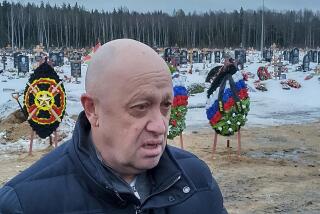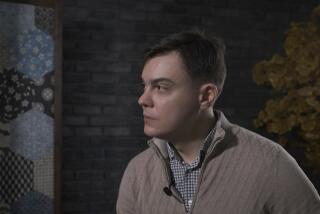Ligachev’s Authority Under a Cloud : Kremlin Spokesman Says New Duties Are Still Undefined
- Share via
MOSCOW — The position of Yegor K. Ligachev, who lost his post as the Communist Party’s chief ideologist last month in a major realignment of the Kremlin leadership, became even more ambiguous Monday when the government’s chief spokesman said Ligachev’s new duties are still being defined.
Gennady I. Gerasimov, speaking at a regular news briefing, said that although Ligachev, the ruling Politburo’s leading conservative, had been named chairman of a new party commission overseeing agriculture, he might be sharing those duties with another Politburo member, Viktor P. Nikonov.
Nikonov has held the agriculture portfolio in the Politburo since 1985 and appears to be closer to President Mikhail S. Gorbachev on questions of agrarian reform.
The party is still in the midst of reorganization, Gerasimov said in reply to a question, and the responsibilities of the top leadership have not been fully assigned.
“In any case, agriculture deserves the attention of more than one person,” he added, indicating that even in this sphere Ligachev’s authority would be limited.
Waged Ideological Struggle
Clearly, Ligachev, 67, no longer ranks as No. 2 in the Kremlin. As No. 2, he had waged a strong ideological struggle to moderate the pace and limit the scope of the reforms, apparently fearing the party might make mistakes by pursuing a more radical course of change.
“What you call a No. 2 does not exist,” Gerasimov declared Monday. He said Gorbachev has no deputy and that when he is absent, the other 11 members of the Politburo decide who will be chairman of their meetings.
“All members of the Politburo are equal,” Gerasimov said, but he added that “some might be more equal than others.”
Gorbachev had several times described Ligachev as the party secretary who oversaw the day-to-day work of the central party secretariat and who headed Politburo meetings in his absence--key functions in shaping the party’s policies and in determining how they were put into effect.
Despite firm statements from informed party officials that Ligachev had lost these powers in the shake-up, Gerasimov said Oct. 1 in New York that Ligachev would retain these duties.
Missed Reform Conference
Questions about Ligachev’s position were raised last week when he did not take part in a major conference on agrarian reform, although he had just been appointed chairman of the new party commission on agriculture. Instead, Nikonov was seen in televised excerpts of the meeting sitting next to Gorbachev, taking part in the debate and taking notes on the points made by speakers.
Gerasimov said then that Ligachev was on vacation but that his chairmanship of the party’s agricultural commission “does not mean that when Comrade Ligachev is on leave, we should not handle agricultural issues.”
Ligachev was back at work Monday, attending a national meeting of Soviet physicians with several other Politburo members. He was seated next to Gorbachev as usual but was listed in official reports after other Politburo members--not second, as was frequently the practice early this year.
While Ligachev appears conservative against the background of the increasingly radical character of Gorbachev’s proposed political, economic and social reforms, known collectively as perestroika , he joined the top leadership as a supporter of change, particularly the improved management of the country’s economy. He has spoken forcefully for political change, including the streamlining of the huge government and party bureaucracies.
Indeed, his voice is more one of caution than of true conservatism. In this he appears to have spoken for millions of veteran party members--most of them in the bureaucratic army that runs the party and government--who are worried that Gorbachev’s reforms have not been fully thought out and will plunge the country into chaos, costing them their jobs and privileges.
Warned of Social Inequalities
For example, Ligachev has opposed suggestions that the market mechanism be allowed to supplant central planning in the Soviet economy, warning that it would widen social inequalities and cause unemployment.
He has expressed concern about the growing pragmatism of Soviet foreign policy, implying that it was approaching ideological disarmament. And he has been increasingly uneasy at the way glasnost, Gorbachev’s policy of political openness, seemed to be bringing party policies, present and past, into disrepute.
Ligachev, a burly party apparatchik who made his political reputation in the Siberian city of Tomsk, had angrily denied as recently as June that there was any split between himself and Gorbachev.
“Whole volumes have been written about the ‘split’ in the leadership that was supposed to have taken shape,” he said at the special party conference held in late June. “All these forecasts have burst like soap bubbles.
“Abroad, they are writing various things about Ligachev,” he continued. “And the enemies are begrudging neither their time nor their words for this. Sometimes I am asked my attitude, and it is the same as the great Russian poet who once said, ‘In the wild cries of bitterness, I hear sounds of approval.’ ”
More to Read
Sign up for Essential California
The most important California stories and recommendations in your inbox every morning.
You may occasionally receive promotional content from the Los Angeles Times.












